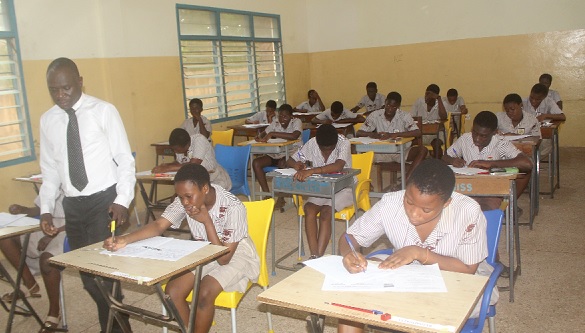
Girls outstrip boys in WASSCE, BECE
Advocacy campaigns over the years to “Send-the-Girl-child-to-School” and other social interventions in the educational sector have served as an attraction to send more girls to school.
Advertisement
This can be seen in the number of girls taking part in the two main national and international examinations — the Basic Education Certificate Examination (BECE) and the West African Senior School Certificate Examination (WASSCE).
Per current statistics, girls now outstrip boys in the two examinations.
For instance, girls last year were more than boys in the 2022 WASSCE for School Candidates (SC).
Out of the total number of 422,883 candidates, 203,753 were males while 219,130, females.
This year too, out of the 447,204 candidates writing the WASSCE-SC, 211,834 are males and 235,370 are females.
For the BECE this year, there are 68 more girls than boys sitting for the examination.
With a total number of 600,714 for the school candidates, 300,323 are males and 300,391, females.
In July last year, the Daily Graphic reported that the country was on the verge of attaining gender parity at the senior high school (SHS) level.
This follows the introduction of the free SHS/ Technical Vocational Education and Training (TVET) policy, which has subsequently helped remove the cost barrier which hitherto led some parents to prioritise boys’ education over that of girls.
According to the SHS/TVET Gender Parity Index (GPI) at the time, the country’s GPI stood at 0.99, with just 0.01 away from achieving gender parity.
It further means that in the not-too-distant future, in a school of about 200 students, there will be 100 boys and 100 girls.
Since the 2017/2018 academic year, the GPI has been increasing.
At the commencement of the free SHS, the GPI was 0.92, with the gross enrolment ratio (GER) for boys being 58.1 and 53.7 for girls.
The GPI went up to 0.94 in the 2018/2019 academic year, while the GER for boys was 64.4 and that for girls was 60.8 during the period.
The GPI further went up to 0.96 in the 2019/2020 academic year, with the GER being 64.4 for boys and 61.9 for girls.
Responding to the development, the Minister of Education Dr Yaw Osei Adutwum, told the Daily Graphic that beyond the fact that an educated workforce was being produced, women were also being lifted up in society, and that had a significant impact in terms of what the nation was doing.
For him, the free SHS had been key, as it had helped to remove the cost barrier, which hitherto led some parents to prioritise boys’ education over that of girls.
Minister
For Dr Adutwum, the removal of the cost barrier was important towards achieving gender parity because the moment it was removed, it opened the floodgates of education to girls who, otherwise, would not have been prioritised by their families.
In its Education Alert Policy Brief, Africa Education Watch said the registration of more girls than boys in the 2023 BECE was as a result of a decade-old policy and multi-stakeholder interventions to improve girls’ retention and survival in basic schools.
At the 57th Speech and Prize-giving Day of the Mfantsiman Girls Senior High School (SHS) in March 2017, the spouse of the Vice-President, Samira Bawumia, said the free SHS policy was not only going to increase access for all, but also facilitate efforts towards achieving gender parity in schools.
For a former Head of National Office of WAEC, Rev. Dr Nii Nmai Ollenu, it was now misleading to assert that the girl-child was still behind the boys.
To buttress his point in a recent article in the Daily Graphic, he quoted statistics from the WAEC Ghana that showed that between 2006 and 2022, the winners of the first three positions in the Distinction Awards of the WASSCE were 46 in all.
“Out of this number, 26 are girls which works to about 57 per cent, and 20 are boys, which makes 43 per cent,” he said.
So is it the case that the “send your girl-child to school” is yielding result as a result of the intervention being put in place or the boy-child has been forgotten.



